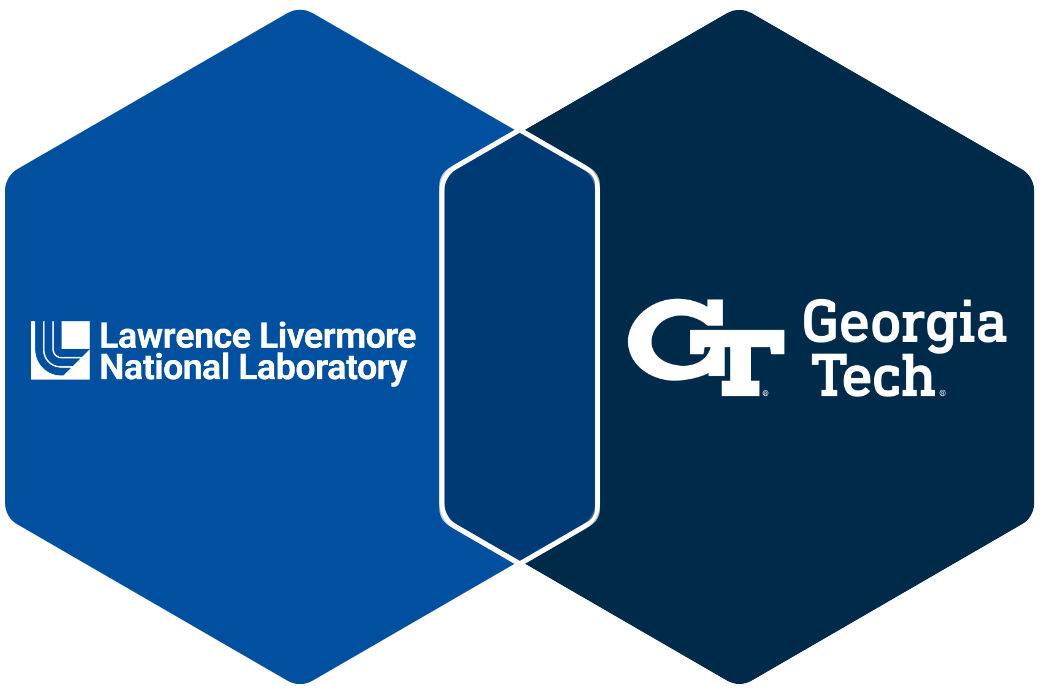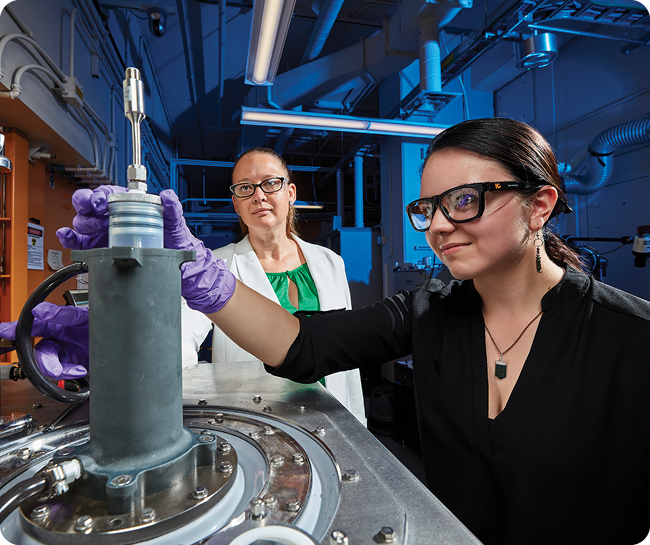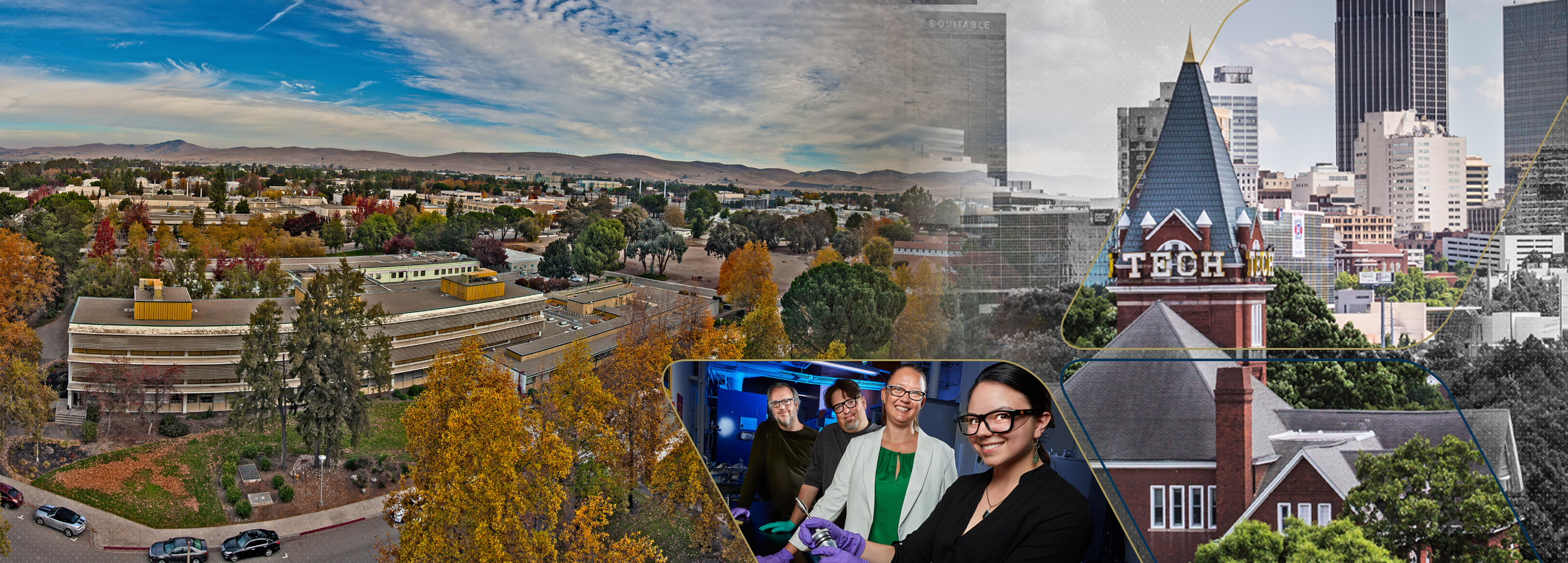Collaborations between Lawrence Livermore National Laboratory (LLNL) and Georgia Tech enable faculty and students to be part of efforts to solve increasingly complex scientific and national security challenges, as well as foster opportunities to engage tomorrow’s innovators.
Partnership Intersection
Georgia Tech and LLNL share research capabilities and expertise in areas such as:
- Advanced manufacturing, including material development and innovative additive manufacturing techniques
- Artificial intelligence and machine learning
- Bioscience and biotechnology, including biomaterials, biofuels, and drug development and delivery
- Climate resilience, including carbon sequestration and critical infrastructure resilience
- Cybersecurity
- Energy security, including fusion energy and other types of sustainable energy production and storage
- High-performance computing, modeling and simulation
- Hydrogen production and storage
- Materials science, including energetic materials, materials for advanced detectors, and materials for extreme conditions, including hypersonic regimes
- Nuclear nonproliferation, including LLNL’s collaboration with Georgia Tech and other research institutions as part of the Consortium for Enabling Technologies and Innovation
- Physics, including condensed matter, optics, and high-energy-density science
- Quantum information science, including quantum computing and simulation, and quantum systems engineering
- Semiconductors, including wide and ultra-wide band gap materials, for applications such as sensors, switches, power devices, lasers, electro-optics, and advanced electronics
- Space science and security, including space-based situational awareness and nanosatellite architecture

Lawrence Livermore National Laboratory
For 70 years, Lawrence Livermore National Laboratory (LLNL) has leveraged science and technology to make the world a safer place. Lawrence Livermore’s defining responsibility is ensuring the safety, security, and effectiveness of the nation’s nuclear deterrent. The Laboratory’s enduring ideals guide mission-driven work, while fostering a respectful and inclusive workplace culture. Its researchers apply cutting-edge science and technology to achieve breakthroughs in enterprise resilience and counterterrorism, defense and intelligence, energy security and climate resilience, and research and development to produce fundamental science discoveries and faster innovation cycles. It’s the ability to put ideals into action that enables continued progress and the translation of innovations into impact at LLNL.
Georgia Institute of Technology
- Georgia Tech's engineering and computing Colleges are the largest and among the highest-ranked in the nation. The Institute also offers outstanding programs in business, design, liberal arts, and sciences.
- With more than $1 billion annually in research awards across all six Colleges and the Georgia Tech Research Institute (GTRI), Georgia Tech is among the nation’s most research-intensive universities. It is an engine of economic development for the state of Georgia, the Southeast, and the nation.
- Georgia Tech’s mission is to develop leaders who advance technology and improve the human condition. Its mission and strategic plan are focused on making a positive impact in the lives of people everywhere.
- For more than 135 years, the people of Georgia Tech have dared to imagine and then create solutions for a better future. The innovative culture and leadership continue, for Progress and Service for all.
Contact Us

Blair Brettmann
School of Chemical and Biomolecular Engineering, School of Materials Science and Engineering
Email
Research Capabilities
Research collaborations with LLNL provide opportunities for Georgia Tech students and faculty to access LLNL’s world-class experimental and computational resources. Examples include:
- Advanced Manufacturing Lab
- Center for Accelerator Mass Spectrometry
- Center for Bioengineering
- Center for Computational Engineering
- Center for Micro- and Nanotechnology
- Data Science Institute
- Energetic Materials Center
- Forensic Science Center
- Jupiter Laser Facility
- National Ignition Facility


Student and Postdoc Opportunities
LLNL collaborates with academic institutions to help them achieve their educational goals for their students.
Student internships. LLNL hosts undergraduate and graduate student interns over the summer or during the academic year, providing hands-on research experience and mentoring by an LLNL scientist. Learn more about LLNL’s internships or explore LLNL’s signature summer programs:
- Atmospheric, Earth, and Energy Division Student Research Opportunities
- Computational Chemistry and Materials Science Summer Institute
- Data Science Summer Institute
- Materials and Chemistry Institute Summer Program
- Nuclear Forensics Summer Institute
For postdoctoral researchers, LLNL provides opportunities for postdocs to conduct world-class research in a diverse, multidisciplinary environment, where they can develop project leadership skills. For example, LLNL postdocs can apply for internal funding to lead a feasibility study or guide a small research team through an exploratory study. Learn more about LLNL’s postdoc program and fellowship opportunities.

Faculty Opportunities
LLNL offers a faculty mini-sabbatical program, bringing top academic talent from colleges and universities across the U.S. to the Laboratory for one- to three-month visits to exchange knowledge and build partnerships. Learn more about these paid, on-site, faculty mini-sabbaticals at LLNL, including how to apply and requirements for sponsorship by an LLNL scientist.
Lab photo credit: Garry McLeod, LLNL






